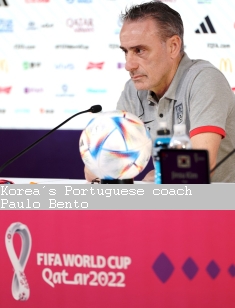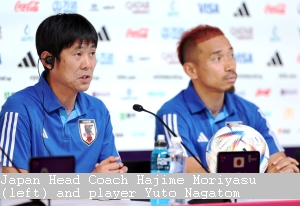By: Gordon D’Costa
Asian challengers, Japan and South Korea, aiming to become the first nation from the continent to win the FIFA World Cup, saw their dreams crash in the first knockout round of this global football tournament in Doha, Qatar on Monday.
Both the Asian football powerhouses played with plenty of grit and determination and played at a top level as they went on to record stunning victories over bigger and stronger teams from Europe and South America.

However, both faced sterner tests against Croatia and Brazil, which they could not overcome and thus ended their World Cup journey. Despite a gallant performance Japan, ranked 24 in the FIFA rankings, lost to Croatia (12th rank) 3-1 in a penalty shootout after the scores were locked 1-1 after regulation period and extra time. Later, South Korea (ranked 28th) danced to the tune of world number one ranked team Brazil and suffered a 4-1 defeat.

Japan Head Coach Hajime Moriyasu (left) and player Yuto Nagatomo
Earlier, Australia 2-1 loss against Argentina in the last 16 round means that all three Asian Football Confederation nations have now made their exits from the competition.
The Japanese played remarkably beyond expectations as they surprised higher ranked European giants Germany (11th ranked) and Spain (7th ranked) by identical 2-1 margins in the group phase and finished top of Group-E.
“We couldn’t overcome the hurdle of the round of 16 and we didn’t make it into uncharted territorty. People might say that to us, but winning against Germany and Spain, former World Cup champions, was a new experience and I believe my players showed that to us,” admitted Japan’s Head Coach Hajime Moriyasu.
“Most importantly, Japan has proved that they can play at the world level and even win. It is a new era that my players have demonstrated to us, so I told them that. I also asked them to use the bitter taste of this experience as springboard for a better future.
“As long as we’re involved in football, whether as players or as team staff, we have to keep improving and brushing up our skills whilst fighting on the pitch, so I told my players that as well,” Mariyasu added.
The South Koreans, ranked 28th, also had an excellent tournament. They started their campaign positively as they drew goalless with Uruguay (14th ranked), but succumbed to a 3-2 defeat against lower ranked Ghana (61st rank) in Group-H. However, they bounced back to shock Portugal (9th rank) 2-1 in the final match and finished second in the group.
“I believe our journey in Qatar has ended in a fair way. I congratulate Brazil, they played better than us. Our strategy of trying to control the match, not letting the pace speed up too much, failed. Other conditions also affected us, like the time we had to prepare for this match. We couldn’t prepare properly, and that made things even harder,” Korea’s Portuguese coach Paulo Bento said.
“Also, Brazil was very effective. However, our achievements in this World Cup are something to be proud of. What we did in the group stage, in terms of technical quality, was very good. I think our participation was noteworthy, it’s something I’m satisfied and proud about. I’m also proud of the four years, a little more, actually, that I spent with the team. Right now I must think about the future, which won’t involve the Korean national team, I can say that for sure. I will rest, and decide what to do next soon after that. I just told the players and the president about my decision,” Bento further stated.
Japan, who were playing the World Cup for the sixth time, did well to reach the round of 16 for the third time. But, they failed to progress further.
The Koreans’ best showing in this global competition was reaching the last four rounds. Korea, who along with Japan had co-hosted the World Cup, had reached the semi-finals under Dutch coach Guus Hiddink. They thus became the first team from outside Europe and the Americas to reach the last four.
The performances of these two national sides is a bright, positive sign for other Asian teams, and prove to them that it is possible to compete and win against the best.
